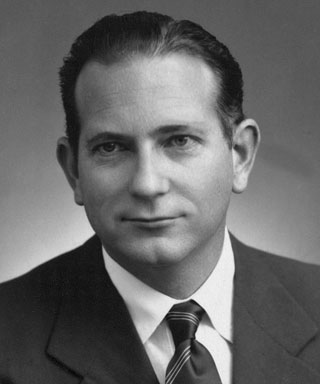For those who think of themselves as fairly well versed in science fiction literature, you’re probably familiar with some of the big names: Asimov, Clarke, Dick, Bradbury, Orwell, Wells, Verne and all the rest. However, fewer people have been exposed to the whimsy, picturesque settings, and punctilious, instantly-recognizable style of Jack Vance.
Jack Vance (1916-2013) wrote over 60 novels and short story collections during his literary career which lasted over half a century, and yet, to many young readers of science fiction, he is a relatively obscure name. Much like other science fiction writers of the time, he was involved in and directly influenced by pulps. Unlike some of the big names, Vance was not subsequently elevated to the role of a literary writer and, in the eyes of some, continued to be a particularly clever pulp writer. Even though I have been reading sci-fi since I was 10 years old, I hadn’t even heard of him until last summer.
Since then, I have begun the slow and luxuriating process of devouring and digesting his works, which is a sensation much akin to having a Chinese buffet all to yourself. There is so much to sample, most of which is delicious (I’m still not sold on the crab rangoon), that reading and rereading Vance could easily keep a serious sci-fi connoisseur like me busy for decades. Don’t believe me? Take a look at the list.
This review, which tries to give the readers a foretaste of what to expect from Vance, focuses on only a few of his works and therefore quite incomplete. For example, his Demon Princes and Tschai science fiction series will be mostly unremarked upon here. To give would-be readers an impressionistic depiction of Vance’s work, I chose to focus primarily on The Dying Earth stories, Vance’s Arthurian fantasy series Lyonesse, and a later series of spacefaring stories he wrote towards the end of his career Ports of Call and Lurulu.
The Dying Earth series of short stories and novels focuses on the Earth of the 21st Aeon. It’s far into the future, the Sun is close to extinction and the inhabitants of the Earth live out the rest of the planet’s days in the moldering mansions and cities left by empires long since extinguished. The stories themselves depict a fantasy world that is just as imaginative as any other in the genre. Strangely-colored flora cover the landscapes of the latter-day Earth and exotic man-eating creatures flit between them.
The Dying Earth stories primarily center on magicians and rogues. The last short story collection in the extended series for example, Rhialto the Marvelous, is about the adventures of one of the last magicians on Earth and his counterparts, although personally I find the best works in the Dying Earth stories are The Eyes of the Overworld and Cugel’s Saga, both picaresque adventure novels detailing the travels of the roguish burglar, cutpurse, thief and all-around-scoundrel Cugel the Clever. They, better than the rest, exemplify the rambling-man, stories-from-the-road adventure format that I think Vance particularly excels at, and is a staple of his writing. Even other works less interested in the picaresque like Suldrun’s Garden, the first novel in the Lyonesse trilogy, are one to lapse into episodic travel narratives.
In Eyes of the Overworld and Cugel’s Saga, Vance paints an intriguing picture of the peoples and lands populating the 21st Aeon. For a sampling, there are: strange religious groups that debate about which permutation of which god performed which bodily function to give rise to the universe, or villagers with alien customs as diverse as sitting and sunning themselves on the tops of tall pillars to lighting bonfires under magnifying glasses to try to keep the Sun alive. Meanwhile Cugel, a typical Vancian antihero, carves a path of inadvertent destruction across the world with schemes of petty revenge. It is, to my mind, Vance in his element.
Vance’s most well-known “strictly fantasy” (rather than science-fantasy) works are contained in the the Lyonesse trilogy, which I have already mentioned. Here, Vance uses the general trappings and aesthetics of medieval romances like the Matter of France and Britain, stories like The Song of Roland and the Arthur legends which blend sorcery and pagan mythology with the medieval court, knights, and chivalry. The fictional Elder Isles, where the stories are set, are also reminiscent of the Atlantis motif, a lost island chain in the Atlantic Ocean off the coast of France that later sinks beneath the waves. Vance even connects the Elder Isles with the Matter of Britain directly by declaring Uther Pendragon to be the son of a runaway noble from that area of the world. The novels also indulge in the habit of anachronism, which they share with Arthurian legends in general, depicting a generally latter Middle Ages rather than its purported 5th century time-period.
But what about the story itself? I find Lyonesse to be one of the weaker of Vance’s works, although I haven’t read the whole set. The narrative jumps around quite a bit more and there are more sets of characters to keep track of. Likewise, I do not think that Vance’s irreverent, anti-teleological and satirical approach to storytelling is really best served by the medieval romance genre. It is jarring to go, for example, from reading something like “Sir Gawain and the Green Knight” to this. But, for those that enjoy that sort of spin on the chivalric tales of yore, it is well up to the task. More importantly, Lyonesse demonstrates Vance’s skill in storytelling, covering in great detail things as mundane as the childhoods of individual characters to occurrences as overarching as the rise and fall of kings, the defeats of armies, sacks of castles and so on.
Finally, I would be remiss not to talk about Vance’s spacefaring stories, which take up a vast swath of his works and his mythic imagination of the future. Many of his standalone books, like Big Planet, and series like Cadwal Chronicles and Alastor are set within the same universe, a region of space known as the Gaean Reach, where humans have spread out at some point in the distant future, colonizing and conquering thousands of worlds.
Vance shares much in common with some of his influences, like Edgar Rice Burroughs, in being more interested with crafting travelogues and stories of high adventure than the science (and thankfully so, given that when Burroughs tried to explain an airplane he had to make recourse to specialized tanks containing a liquidized form of light rays as a source of propulsion).
I haven’t read extensively in Vance’s space sci-fi, but I decided to sample Ports of Call, as it adapts the earlier picaresque travel narrative format that Vance seems most comfortable with to the setting. Some other works that explore Vance’s other preoccupations, like his interest in social constructivism and languages, are The Languages of Pao and the short story “The Moon Moth.”
Ports of Call is one of Vance’s last novels. It tells the story of Myron Tany, a young man with the ambition to be a space explorer, stranded on a strange planet by his capricious great aunt and compelled to make his way as supercargo aboard a wayward space-freighter. It and the related novel Lurulu have more of the character of the Cugel stories, where wandering is set deep into the bones of the characters. The Gaean Reach, much like Earth of the 21st Aeon, is represented in a series of flashing, picturesque episodes, populating the universe with all sorts of exotic and alien cultures, customs and peoples. Kaleidoscopic in its world-building in a similar degree to the Dying Earth stories, it transfers that whimsical wandering of Vance’s earlier protagonists into ones that feel older, more heavy with the weight of years and emotions (no doubt as Vance himself likely was towards the end of his career). They suggest, to me, Vance’s ability to write at many different registers: the absurd, the satirical, the whimsical, the wistful, the longing.
There isn’t a reader of science fiction or fantasy that shouldn’t, at least once, dip his or her toes in the massive lake that is Vance’s literary corpus. These days, the biggest obstacle to finding Vance’s works is simply getting printed copies. Luckily, if you’re a fan of audiobooks you can find a lot of Vance’s work on Audible. You can also come across a lot of his work either free or rather cheaply in online formats. Trust me, if you come to be a Vance addict like me, I understand your pain.
Photo Credit / JackVance.com



Yes, 3 time Hugo award winner, Nebula award winner, Edgar award winner, Jupiter award winner, and Sci-fi and Fantasy Writers of America grandmaster, and oft-cited influence of a hugs list of other authors. You mean that “lesser-known” author? You must not read much science fiction. Clever pulp writer? Have you paid any attention at all to his use of language? You must be kidding, because your article is a joke.
If you’ve ever played a game of Dungeons & Dragons, then you’ve already felt his influence. D&D’s magic system is taken from Vance’s Dying Earth stories.